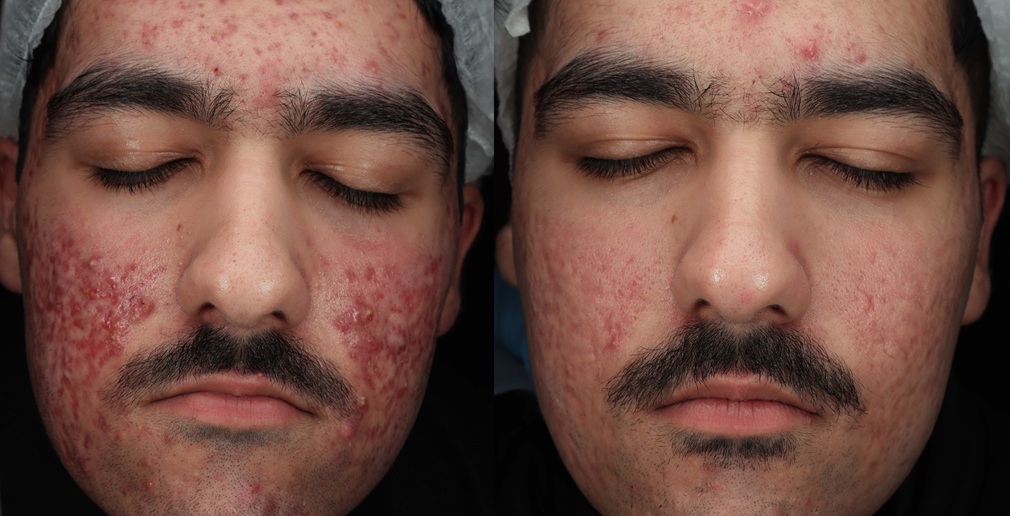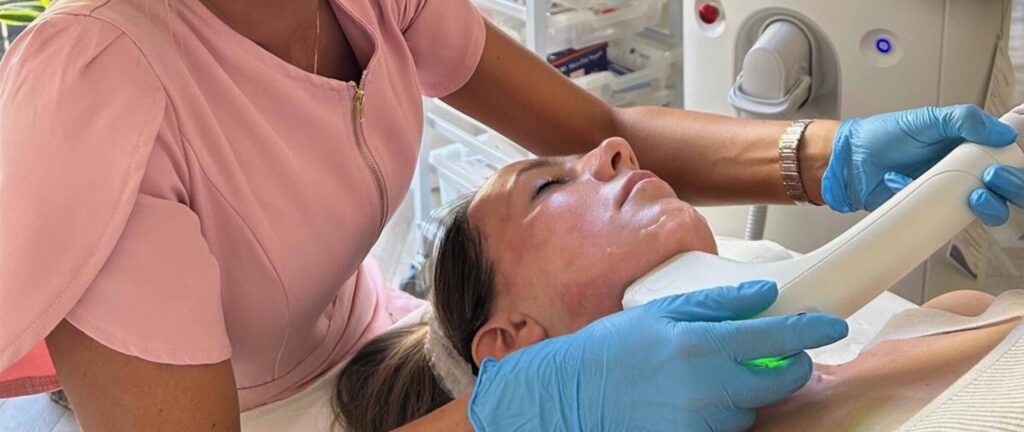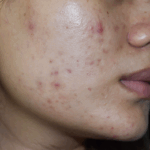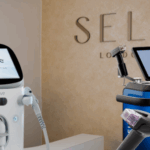
What No One Tells You About AviClear: Truths from the UK’s Most Experienced Acne Clinic, Explained by London Dermatologist, Dr Anjali Mahto
AviClear is not just another aesthetic treatment. It is the first laser designed to treat acne at its biological root, the sebaceous gland, and the first serious alternative to long-term medication for mild, moderate and severe acne. This is very much a medical, not cosmetic treatment, and we truly believe this to be the most exciting development in the world of acne for decades.
At Self London, we were the first consultant dermatology-led clinic in Europe to invest in AviClear. Since then, we have treated more patients with this device than any other clinic in the country. We do not say this lightly. We have observed how this laser behaves in real skin, across different ages, ethnicities, hormonal patterns and acne histories. That experience has given us something few clinics have. Perspective.
This article is not a sales explainer. It is a reflection of what we have learned, what patients misunderstand, and what genuinely matters if you want AviClear to work. These are the insights that do not appear on social media or device marketing decks. But they are often what make the difference between disappointment and success.
The most important results are often not visible straight away
Patients often ask to see before and after images. Acne is a visual condition, and aesthetic treatments are usually judged by how the skin looks a week later. But AviClear is not targeting surface inflammation or pigmentation. It is targeting sebum production. That process unfolds gradually, deep in the dermis. It is biological, not cosmetic, and in many cases, the first changes occur long before anything visible happens.
One of the earliest shifts we notice is reduced oiliness. The T-zone becomes less shiny. Congestion starts to flatten. But to the patient looking in the mirror, nothing yet looks ‘better’. Breakouts may persist. Texture may still appear uneven. This is not failure. It is simply the sequencing of how biological treatments work; acne treatments take time to work and patience is required. In our experience, early oil suppression is often a strong predictor of long-term improvement.
Flare-ups can occur
There can in some cases be an initial flaring of acne before improvement with AviClear. This is also true for other acne treatments such as topical retinoids or oral isotretinoin use. Our internal clinic flare rate is approximately 12%. If a flare-up occurs, it is most likely after the first or second session. For some, the reaction is mild. For others, it can feel like a setback.
We always prepare patients for this, and the key thing is that it does not happen to everyone. We are able to prescribe oral medications to reduce the risk of flaring as an option to patients. Any flaring indicates that the sebaceous glands are responding and the skin is shifting.
This is not easy for patients to tolerate unless they are supported by a team who understands what is happening. At Self London, we track these patterns closely, and can often reassure patients based on the dozens of cases we have managed. A flare can feel frightening, but in the right context, it is simply part of the process.

Some of our best outcomes were in patients we initially thought were borderline
In the early days, like many clinicians, we followed the published manufacturer data. We treated patients with moderate to severe papulopustular acne, visible oiliness, and active lesions. Over time, we began to expand our criteria cautiously. We started treating persistent low-grade acne in women post-isotretinoin. U-zone relapses, hormonal acne in skin of colour, late-onset acne in perimenopausal women, pregnancy, breastfeeding, the list goes on. And to our immense satisfaction, many of these patients responded extremely well.
What this taught us was that AviClear may be more versatile than initially believed, provided that patient selection is thoughtful. We do not treat everyone who enquires as we have multiple methods of acne management in our clinic. But we are more confident now in recognising patterns that respond, even if they do not fit the original textbook definition. That confidence comes from clinical experience, not device training. It comes from watching the treatment work over and over again.
AviClear is not for everyone
We have seen patients from other clinics who say AviClear did nothing. Often, they were not the right candidates. Some had pigmentation or textural issues mistaken for acne. Others had post-pill congestion that was already resolving. Some simply wanted clearer pores or smoother skin. In others still, underlying hormonal diagnoses had been missed as the provider did not have appropriate medical or dermatological experience.
AviClear is not a glow treatment. It is not for cosmetic concerns. It is designed to reduce sebum output and calm sebaceous-driven acne. If that is not the issue, the treatment is unlikely to help. And using it in the wrong cases undermines trust in what it can actually do.
At Self London, every patient is assessed by a medical professional before starting. We review the acne history, hormonal triggers, sebum profile and VISIA imaging. If AviClear is not the right treatment, we say so. We do not recommend it just because it is the newest technology.
The three-session protocol is not a magic number and permanence is not the same for everyone
Patients often ask, “Will it last?” The honest answer is that results vary. For many of our patients, oil suppression lasts for 12 months or longer. Some never relapse. Others experience a slow return of oiliness around the nine-month mark. A few may need single “top-up” sessions.
These variations are expected. They depend on hormonal stability, genetics, skin type, stress, and other external factors. AviClear is a biological intervention. And biology is not uniform.
We do not promise permanence. We explain that the laser affects sebaceous glands in a way that may be long-lasting, but maintenance may be required in certain cases. When used correctly, it often gives patients the longest remission they have had in years. But it is not a one-size-fits-all treatment.
Clinic experience matters when the treatment timeline causes uncertainty
The most common question we receive is, “Is this normal?” That question always comes from a place of doubt. Doubt that the treatment is working. Doubt that the skin will recover. Doubt that the investment was worthwhile.
Inexperienced clinics cannot answer that question with confidence. But when you have treated more cases than anyone else, you begin to recognise the patterns. You can show patients how oil reduction may precede lesion reduction. You can explain why a third session often tips the scales. You can reassure them with evidence, not guesswork.
Patients need to feel held through this process. AviClear can cause visible disruption before it improves the skin. The more experience a clinic has, the better they are at helping patients navigate that disruption without abandoning the process.

We do not bundle in extra sessions but we offer them where appropriate
At Self London, we do not oversell. Most patients complete three sessions and do not need more. But for those with severe oiliness or longer-standing acne, a fourth or fifth session may be discussed. We do not offer these automatically. We assess the skin, the oil profile and the patient’s overall treatment journey.
We also do not pressure patients into maintenance packages. Some return after six to twelve months for a top-up, particularly if they have relapsed repeatedly on multiple courses of isotretinoin or there is a known hormonal trigger such as coming off contraception or entering perimenopause. Others never need additional treatment. Our view is that maintenance should be based on skin biology, not business models.
No acne treatment is perfect and no outcome is ever guaranteed
One of the most difficult truths about acne is that there is no perfect fix. Every treatment, whether topical, oral, or laser-based, has potential benefits and risks. None offer a 100% guarantee. And none work for everyone in the same way.
This is not a fault of the treatment. It is simply the reality of biology. Acne is complex. It is hormonal, genetic, inflammatory and environmental. Some people respond quickly and permanently to a single intervention. Others need years of trial and refinement. Sometimes the skin behaves unpredictably, despite the best care.
At Self London, we recognise that some patients, through no fault of their own, have to work harder at their skin than others. That is not a reflection of personal failure. It is not something to be ashamed of. It is just the nature of acne as a condition. And it is why we do not sell false certainty. We offer clinical expertise, experience, and the commitment to help you find what works for your skin, not someone else’s.
AviClear is not the full solution but it changes the playing field
AviClear is not a miracle cure, but it is a serious intervention that can alter the trajectory of acne. It can reduce the need for systemic medication. It can extend remission. It can shift the skin out of chronic inflammation and into a more stable, less reactive state. For many of our patients, it is the treatment that finally breaks the cycle. Once the skin is calmer, we can begin to address other concerns, pigment, texture, scarring, in a much more effective way. This is why AviClear is not just a treatment but a turning point. It can have life-changing results when it is delivered by a clinic that understands acne, understands skin biology, and has the experience to guide patients through what is not always a linear process.





